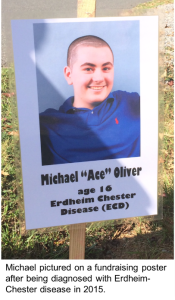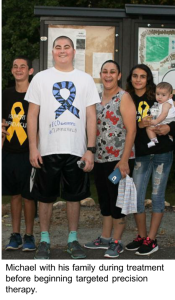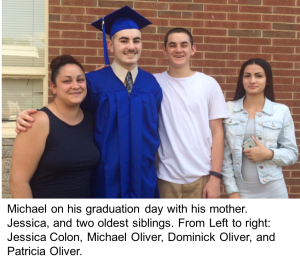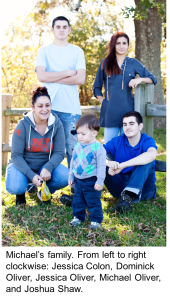The Boy with Erdheim-Chester Disease
15-year-old is diagnosed with ultra-rare blood cancer found predominately in adults and lives to tell the tale
By Elizabeth S. Anderson, ECD Global Alliance
July 13, 2017
 “Do you know any other young adults with Erdheim-Chester disease?” I asked Michael Oliver of his ultra-rare disease. “None.” He replied.
“Do you know any other young adults with Erdheim-Chester disease?” I asked Michael Oliver of his ultra-rare disease. “None.” He replied.
Michael is now 17 years old, but he was 15 when he was finally diagnosed with Erdheim-Chester disease (ECD). ECD is a very rare type of blood cancer that can affect several organs in the body, including the brain and can progress to be life threatening, especially if left untreated. What’s especially unusual about Michael, is that he is one of a handful of young adults and children dealing with a disease that predominately affects men and women in middle age. This makes Michael’s ECD diagnosis even rarer than normal.
The young Stafford, Virginia resident today, by all accounts, lives life like a normal teenager preparing for college as a nurse. He loves spending time with his three younger siblings, plays basketball, and even has his own Chihuahua-Bichon mix he relishes taking care of, Ghost. Since he was a boy, Michael has been very sick. Although today, his ECD is stable due to his involvement with a clinical drug trial.
“We had gone to his pediatrician from the time he was twelve because Michael started having some very strange symptoms.” Michael’s mother, Jessica Colon, recalls how the ECD diagnosis journey started. “He was in sports. He was always running, he was always doing things, so the pediatrician just chalked it up as growing pains and just being a teenager.”
Michael suffered from debilitating headaches, light-headiness when being active, bone pain, and was losing weight despite his and his mother’s efforts to ensure he was increasing his protein intake. Of all the symptoms Michael dealt with, it was the amount of water he would drink that was most alarming to Jessica. She remembers, “He started drinking gallons of water. So, I thought maybe he should be tested for diabetes, but the pediatrician said there was nothing wrong with him.”
Finally, on New Year’s Day in 2015, Michael’s pain and sickness came to unbearable levels and Jessica took her son to an urgent care clinic. She admits, “I just pleaded to the urgent care lady. I said please just help me! I don’t know what’s wrong with my son, but something is wrong with him!” This time, the medical professional listened.
It would be months before physicians would arrive to Michael’s unlikely, but certain ECD diagnosis after performing pituitary and brain tumor biopsies later that year. Mother’s Day of 2015, when Jessica was in the hospital with her youngest child due to a heart condition and after Michael’s second brain biopsy, ECD was confirmed.
Jessica retells Michael’s reaction to his diagnosis. “I remember clearly when Michael said, ‘At least I know I’m not crazy. Something is wrong with me. I’m glad it’s me and not my brother and sister because I’m strong enough to deal with this.’”
From the time he started getting sick, until being admitted into a clinical trial for treatment in 2016, Michael struggled with the change in his life that this condition forced upon him. Once he finally received a diagnosis, his doctors placed him on steroids and chemotherapy. They believed it would help eradicate the cancer, but matters only worsened. Before the treatment, he could participate in basketball, football, and school. As his illness progressed, hospital stays for biopsies increased, and medications to treat the illness ensued, he needed to quit sports and he missed so much school that he was in jeopardy of not completing high school. Michael recollects what it was like to be so sick. “I would say that time was probably the worst time I’ve experienced being sick. It was difficult because the medicine was making me emotional and then I gained a lot of weight.”
2016, Michael struggled with the change in his life that this condition forced upon him. Once he finally received a diagnosis, his doctors placed him on steroids and chemotherapy. They believed it would help eradicate the cancer, but matters only worsened. Before the treatment, he could participate in basketball, football, and school. As his illness progressed, hospital stays for biopsies increased, and medications to treat the illness ensued, he needed to quit sports and he missed so much school that he was in jeopardy of not completing high school. Michael recollects what it was like to be so sick. “I would say that time was probably the worst time I’ve experienced being sick. It was difficult because the medicine was making me emotional and then I gained a lot of weight.”
Fortunately, things got better. A friend of the family connected ECD Global Alliance Referral Care Center physician, Eli L. Diamond at Memorial Sloan-Kettering Cancer Center with Jessica and Michael. Dr. Diamond consulted with Michael’s doctors about changing his treatment plan to an experimental precision medicine. The new therapy was showing positive outcomes in adult patients and Dr. Diamond believed that this might be a good option for Michael.
Michael has been on the experimental therapy through Children’s National Medical Center in Washington, D.C. for over a year now and reports optimistic results. Michael enthusiastically reports, “It is the best thing. It’s amazing. It’s targeted. So, there’s much less symptoms but my leg [tumors] have nearly cleared up and my brain tumors are stable, so it’s amazing.”
The ECD Global Alliance (ECDGA), the only non-profit dedicated to supporting those affected by ECD, only has 16 pediatric-diagnosed ECD patients registered out of a total of 442 cases. ECD is not a disease that researchers believe commonly affects children; however, it is related to Langerhans Cell histiocytosis (LCH), which is commonly found in children. There is a belief that ECD could be more prevalent than it is reported due to misdiagnosis, since symptoms can be attributed to other diseases. Therefore, there could be more children and adolescents suffering with ECD than thought.
The Alliance funds research and annual symposia to connect ECD-knowledgeable and interested medical professionals to further understand and treat ECD. It was through the ECDGA’s resources, the family friend had been able to discover Dr. Diamond and it is through the organization that both Michael and Jessica have been able to find emotional support from the organization’s member community.
Although Michael has never connected with another young ECD patient, he has found support through a correspondence relationship with another adult ECD patient. Jessica discusses the relationship. “They were pen pals. They would send emails to each other all the time. They just decided to write one another and then before you know it they were always emailing each other through both their treatments. And not necessarily about ECD but just talking about life. And at that time, it actually really helped because Michael was so depressed. And he was going through so much, and it was hard for me to talk to him, because I didn’t know how he was feeling.”
 Jessica also found solace in speaking with other caregivers through the ECDGA’s ECD Caregivers Group, an online chat community made of ECD caregivers to support one another. Jessica explains why the online support group has been beneficial. “There were times that I just didn’t know what to do anymore. And if it wasn’t for talking to them late at night, I would have just cried myself to sleep almost every night. But they helped me through so much.”
Jessica also found solace in speaking with other caregivers through the ECDGA’s ECD Caregivers Group, an online chat community made of ECD caregivers to support one another. Jessica explains why the online support group has been beneficial. “There were times that I just didn’t know what to do anymore. And if it wasn’t for talking to them late at night, I would have just cried myself to sleep almost every night. But they helped me through so much.”
In addition to funding research, hosting medical symposia, and facilitating connections between ECD medical, patient, and caregiver communities, the ECDGA also hosts an educational and fellowship driven annual Patient and Family Gathering conference. Michael and Jessica both look forward to attending the event this coming October in New York City and meeting others affected by the ultra-rare disease for the first time.
Michael and Jessica’s experience with ECD has been complicated and arduous, but they have both drawn important life lessons from what they have endured. Michael has discovered new depths of his strength and perseverance. He counsels, “I realized that I can do more things than I think I can. And I could tell my sibling’s the same thing. I could’ve very well never finished high school, but I was able to. So, I started telling my siblings, don’t accept defeat.”
Jessica has also accepted a new understanding of perseverance as a mother. She advises other parents dealing with a seriously ill child, “Even if you take your child to a doctor, and even if you’re being told that there’s nothing wrong, and you really, truly feel that something is – don’t give up. Just really go with your gut and don’t give up. Never accept there’s nothing wrong until you really run out of every option, and you’ve really done every test and done everything.”
If you’d like to learn more about Erdheim-Chester disease or believe you or someone you care about may be affected by ECD, visit www.Erdheim-Chester.org. The ECD Global Alliance website is the leading resource for patients, family members, and medical professionals to connect with one another and get help in the fight against Erdheim-Chester disease.








